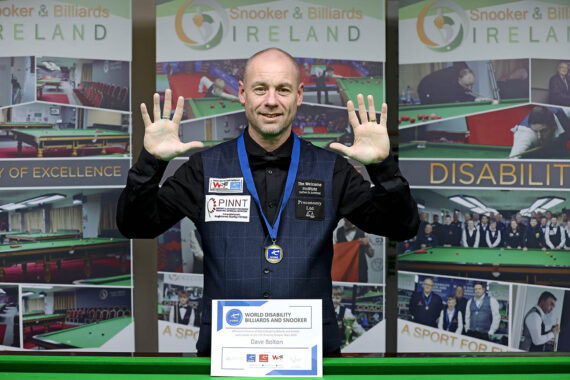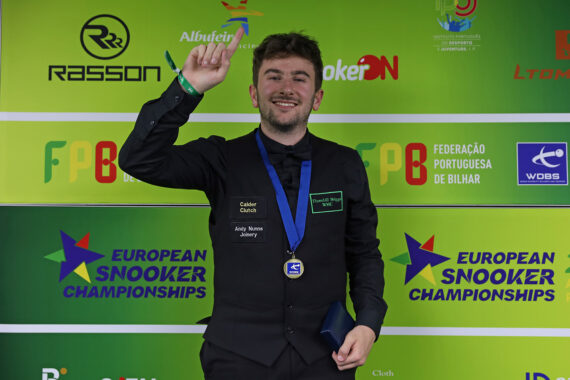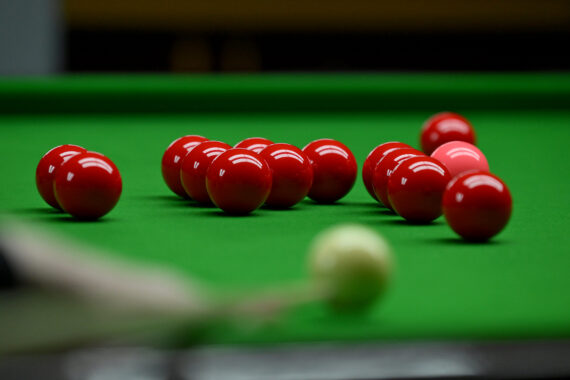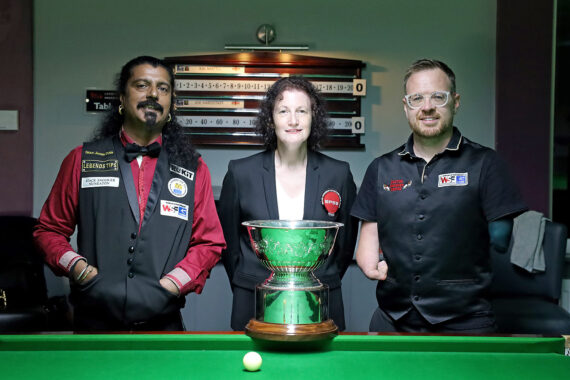WDBS Classification Guide: Group Three
Today we continue our journey through the World Disability Billiards and Snooker classification system, used to determine which players are eligible to play in each WDBS event.
This week we look at the group three profiles, the first group which includes ambulant players who have a physical disability.
WDBS Disability Classification
The WDBS classification system comprises 36 individual profiles, which have then been allocated to eight groups, used to categorise events.
The system has been taken from the English Federation of Disability Sport (EFDS) profile toolkit and revised to suit snooker and billiards.
Group 3 (profiles 12-14, 16, 26, 31-32)
Profile 12: Able to walk, but has severe difficulty controlling all four limbs when performing an activity.
Profile 13: Able to walk, but has poor use of three limbs.
Profile 14: Able to walk, but one side of the body is of little use; usually can only balance unaided on the good leg.
Profile 16: One upper limb is severely impaired.
Profile 26: Able to walk, but has moderate difficulty controlling all four limbs when performing an activity.
Profile 31: Both legs severely impaired, both arms moderately impaired.
Profile 32: Both arms severely impaired, both legs moderately impaired.
Group three is the first of three groups for ambulant players (i.e. players able to walk), who have other physical disabilities. The group is made up of five disability profiles (12-13, 26 & 31-32), plus a further two ‘either/or’ profiles (14 and 16).
Players falling under these two profiles without orthosis/appliances will be assigned to group three, whereas those with orthosis/appliances compete in different groups.
At the WDBS events held so far, group three players have competed together exclusively in competitions. Of the three ambulant groups, players classified as group three are the most affected by their disability when playing across all groups
Player view
We have a number of regular group three players at WDBS events, none more so than Kal Mattu and Daniel Blunn who have attended each of our three events so far, either in a playing or support capacity.
Blunn, who hails from Sutton Coldfield and has cerebral palsy, was a winner at the inaugural Open Disability Snooker Championship in Gloucester last year and also made the final of the group three competition at the Manchester Open.
He was only four years old when he first came across snooker, before he began to play on a full-size table at the age of 10:
“I went to the Tamworth Snooker Centre and started to play a number of junior players at the time,” said Blunn. “I really enjoyed it and it went from there. I played Jimmy White when I was 11 in an exhibition as the most improved junior (managed to beat him on the black actually), and I’ve played in a number of tournaments since.”
A real student of the game who has in the past worked with SightRight’s Steve Feeney and more recently enjoyed coaching from qualified WPBSA World Snooker coaches at WDBS events, Blunn still loves snooker as much as he ever has.
“The most positive aspect of playing snooker for me is that first of all it is an enjoyable sport. There is plenty of scope for improvement and where you can progress in the game. There is something in it for everybody. I’m privileged to be able to play in these tournaments.
“It is also a great way for me to be able to shut off from work. It gives me enjoyment and targets to see where I can progress to. It’s like a bit of me time, it gives me a life away from work.”
Blunn has been competing in tournaments for a number of years, but has welcomed the launch of the WDBS and the events that have been held during its first year. He has also been a part of related activities including visits to the World and UK Championship and was also able to complete the WPBSA’s level one coaching course earlier this year.
“I think the events so far have been excellent,” added Blunn. “The great thing about them is how competitive they are. At the first one at Gloucester for example, you could just see the intensity on everybody’s faces.
“You could also see how well-run the event was and just what a great venue it was. You could see that it was the start of something big. Everybody is competitive but there is also space for us to get along, there is no bad blood anywhere or animosity between anyone.
“I think that the WDBS has also got me involved in other things which have been really nice. I got to go to the Crucible for a day, to complete my level one coaching course and have watched professional snooker in the arena. All of this has come from the WDBS, especially with the TV feature early on in Gloucester which has really put us on the map.”
And now Blunn is looking forward to the defence of his title in Gloucester when the WDBS returns for the 2016 Open Disability Snooker Championship in October:
“It is going to be great to see if I can defend my title in Gloucester. Whatever happens I’ve won it so I’ve got that one in the history books, but defending it would be nice. Let’s see what I can do, it’s certainly going to be an interesting one!”
You can learn more about the English Federation of Disability Sport and their recently launched #TogetherWeWill campaign to help encourage disabled people to become more active.
Next week we look at our group four classification, the second of the three ambulant groups.






